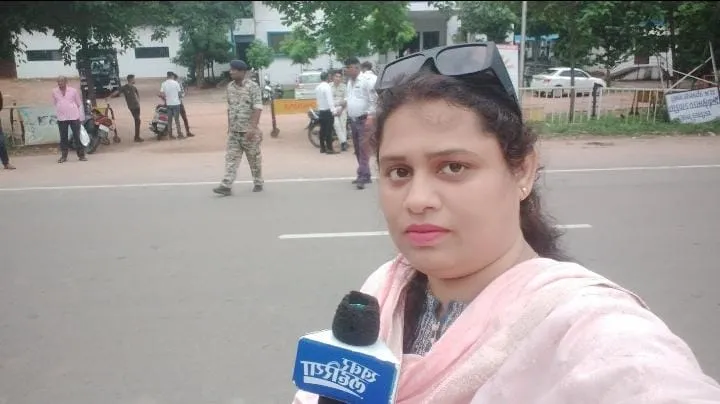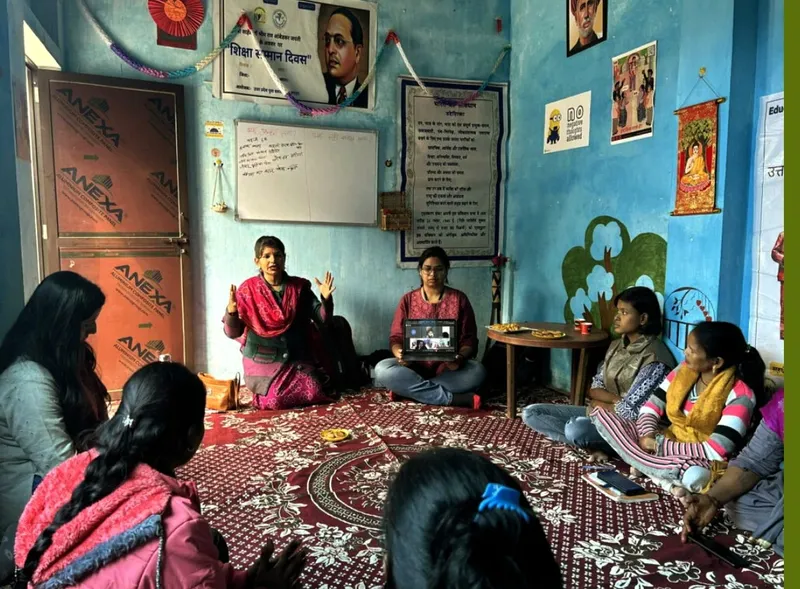This social enterprise is empowering Dalit, Adivasi women to be their own storytellers
Chambal Media portrays society from the perspective of the most marginalised women to empower social change through hyperlocal content.
Journalist Amreen Banu’s love for storytelling has the power to invigorate any tired journalist in the city who’s disenchanted by the system.
She’s a stringer at Khabar Lahariya, an all-women brand of independent rural news. Before joining the platform, Banu was a fellow of Chambal Academy, the training vertical of Chambal Media, a pioneering social enterprise empowering women in rural areas through mobile journalism and digital literacy, so that they can tell their own stories.
Since her association with the Academy began in 2020, Banu’s life hasn't been the same.
The second of three sisters from an orthodox Muslim family in Madhya Pradesh's Chhatarpur district, Banu had to drop out of school after Class 5. Her father, mother and paternal grandmother met with a road accident a few years ago, following which she had to step in to support her family.
Through the course of her family’s long-term hospitalisation, Banu decided to address her existential angst by signing up for a videography course conducted by Dalit Shakti Kendra (DSK), a vocational training centre in Gujarat. She was eventually taken in by Chambal Academy under its rural mobile journalism fellowship and has been reporting on patriarchal domination, systemic violence and poverty in her region for four years now.
Today, Banu often works all day to run the household and produces two to three digital stories a week, working through the nights. Two days after she suffered a miscarriage, she was back in the field.
Banu, along with another woman in her district who works for Khabar Lahariya, are the only two women journalists in the region.

Ameera Banu of Chhatarpur had to drop out of school to support her family. She joined Chambal Academy's fellowship about four years ago and is only the second woman in her region to practice journalism today.
“I can see what a difference it makes to our stories of deprivation, poverty and gender, when we tell them, just as they are,” says Banu.
“No matter how holistically an urban journalist strives to report these issues, what they lack is the lens of lived experience, which adds authenticity and character to our stories,” she adds.
Giving agency to Dalit, Adivasi women
Chambal Media was founded in 2015 by a diverse team of rural and urban media practitioners with over 20 years of experience in producing local language content for rural audiences. The company, which also owns Khabar Lahariya, was established with a mission to integrate the perspectives and involvement of marginalised women into India’s digital revolution.
In addition to creating media products, Chambal Media focuses on training and mentoring rural women in remote districts in Uttar Pradesh, Madhya Pradesh and Bihar, equipping them to become researchers and content creators who often join their transformative network of new media professionals, or find media jobs outside.
What’s revolutionary about their work is that many of the trainees are dropouts who would have otherwise been given into early marriages, or resorted to cheap labour to earn a livelihood.
A deep dive into local issues
Chambal Academy’s programmes emphasise not only technical skills like mobile journalism but also critical gender and caste awareness.
Many trainees are unfamiliar with terms like ‘gender discrimination’ or ‘intersectionality’. Yet, when guided through conversations about their personal experiences, they quickly recognise and share stories of caste and gender-based biases they face, says Gargi Yadav, Programme Manager at Chambal Academy.
The stories covered by the girls through their work at Chambal Media offer a powerful glimpse into life in India’s villages, focusing on issues that often go unnoticed by mainstream media. Many of these stories revolve around developmental challenges, such as inadequate infrastructure or access to resources like water.
"Our girls are uncovering stories that matter to them, and reflect the realities of their communities," says Yadav. “When we wanted to understand the issue of water through the lens of these women, for instance, we saw that our team was always directed to meet the male elders of the village. But central to the subject of water are in fact the women, who walk miles to fetch it for their homes, risk their personal safety and also have to ration the water through the day to sustain their families,” says Yadav.
The first time their team of women was asked to speak to people —including men in their communities—to report stories, many of them revealed they had never questioned a man in their life.
After one of the girls trained by Chambal Academy from Bihar reported on water shortage in her village, a new hand pump was installed within two months. This underscored the impact that their journalism can have on local development.
Another report about the socio-cultural consequences of working in brick kilns by one of their fellows, Soni, highlights the politics of gender and labour rights that Dalit/Adivasi women workers face at brick kilns.
"We learnt through our engagement with the girls that their village elders give out their lands for a small sum for brick kilns to be set up. However, when these brick kilns move away, the land doesn’t just revert back; it becomes barren. Farmers are often left without viable land for cultivation, which is a tragic consequence of development that rarely gets seen or reported,” says Yadav, explaining the shrewd and often real-time perspectives that their trainees inherently carry.
The media literacy training the girls receive is vital. They are trained not only in mobile journalism but also in digital security. Yadav explains, "We want to ensure that they navigate the digital world safely. Understanding privacy and how to report harassment online is crucial in today’s times."

Chambal Academy has trained 500 girls and women from marginalised communities to become digital storytellers.
Additionally, Chambal Academy emphasises on tackling misinformation in a community-centric way. Rather than using technical fact-checking methods—which are often associated with misinformation and disinformation—they encourage their girls to ask critical questions within their own circles.
"Fact-checking doesn’t have to be technical," says Yadav. "We teach them to engage with their community—ask village elders or local leaders about the information they encounter."
Chambal Academy trains its girls on rural reporting by ensuring they don’t just focus on one angle. They research stories from multiple perspectives, providing a more nuanced and complete picture.
Discussions with their trainees are often held at Mahila Chaupals or group gatherings of women in their villages, where they discuss issues plaguing their daily lives.
“A discussion on a rape that happened in their village led to a deeper understanding of caste, for instance. Our women understand intersectionality by studying their lived experiences as a collective and finding ways to narrate these stories through a deep understanding of their place in society,” says Yadav.
Over 500 women have been trained so far by Chambal Media and Khabar Lahariya. The team seeks to build on, amplify and accelerate this impact through mobilising young women from rural communities to inspire and embolden others to get in tow.
“Today, I accompany the most downtrodden women in my community who have been duped out of government jobs, compensation or land by powerful locals to police stations and lodge complaints,” says Banu. “Not just my family, my whole village looks at me as a person of influence. I know I will not stop working - no matter how hard it is - because our tribe needs to grow."
(The article was updated with changes.)
Edited by Affirunisa Kankudti





![[Funding alert] AgroStar raises $70M Series D investment, will invest in tech and expansion](https://images.yourstory.com/cs/2/a9efa9c02dd911e9adc52d913c55075e/AgroStar-1638858370952.jpg?mode=crop&crop=faces&ar=1%3A1&format=auto&w=1920&q=75)
